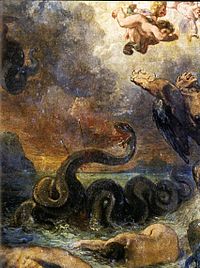Python (mythology)
In Greek mythology, Python (in Greek Πύθων, Pýthon) was a great serpent that participates in the legends of the foundation of the sanctuary of the oracle of Delphi. Called "divine serpent", according to Simonides and other authors the dragon is male, but in the oldest versions it was a female. of animal species, as well as monsters were also born. Thus the Earth, without the help of a man and without having wanted it, engendered this serpent of immense size that was the terror of the newly created peoples.
Some say that Apollo, who had learned the art of divination from Pan, arrived at Delphi —then it was Themis who prophesied—, and as the Python serpent that guarded the place prevented him from approaching the abyss, he killed it and took possession of it. oracle. The serpent—although monstrous, it was only a creature of a few days—had a mottled back, the color of wine, and was covered with a gloomy laurel with good leaves for armor. Indeed, it is said that Apollo, crowned with laurel from Tempe and with a branch in his right hand, he decided to found a sanctuary at the foot of Mount Parnassus, near Delphi. Nearby there was a fountain and Python devoured both animals and men in it. Hera herself had entrusted custody of her son Typhon to this serpent. Since Python had prophetic powers and was a match for Apollo, he decided to eliminate his rival by shooting him to death.The locals say that Python rotted after his death and that is why the city was named Python. Indeed, those of that time said to rot pythesthai. It was said that Python was buried under the omphalo of the temple of Delphi.
Hyginus, a late author, refers to a different version. He tells us that he was fated to die at the hands of a descendant of Leto. Zeus eventually ended up mating with Leto and when Hera realized this, she decreed that Leto should give birth in a place where the sun did not shine. When Python learned of Leto's pregnancy, he pursued her with the intention of killing her. But by order of Zeus the Boreas wind carried Leto away and left her in the hands of Poseidon. He protected her from her, but in order not to break Hera's decree he took her to the island of Ortigia, and covered the island with waves. Python, failing to locate Leto, returned to Parnassus. Poseidon made the island of Ortigia emerge and later it was called the island of Delos; on that island Leto would give birth to Artemis and Apollo. Four days after Apollo was born, he prepared revenge for his mother's wrong. In this way he went to Parnassus and killed Python with his arrows—because of this work he is called Pythius. Apollo put the bones of Python in a cauldron, deposited them in a temple and instituted funeral games in honor of himself, which he called "Pythians". Finally, according to an aberrant tradition, Python was the daughter of Crio, who ruled with authority in Boeotia.
